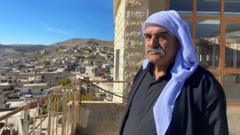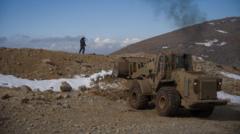Beirut is plunged into chaos following a sudden series of Israeli airstrikes, signaling an intensification of the conflict and prompting urgent evacuations among terrified residents.
Intense Airstrikes Rattle Beirut as Panic Ensues Amid Escalating Conflict

Intense Airstrikes Rattle Beirut as Panic Ensues Amid Escalating Conflict
Israeli bombardment causes widespread fear in Beirut as civilians scramble to flee.
In a shocking turn of events, the Lebanese capital of Beirut experienced its most intense bombardment since the outbreak of renewed hostilities between Israel and Hezbollah. A surprise airstrike razed a four-story building in the city center on Tuesday, prompting a cascade of further strikes that sent black smoke billowing into the sky. Civilians, already on edge due to the war, were inundated with warnings of additional strikes, causing mass panic as people rushed to escape from the targeted neighborhoods.
Many residents, including 52-year-old Mohammed Awada, expressed their desperation, indicating that there seemed to be “no safe place” amidst the chaos. The Israeli military’s alerts for further strikes contributed to the turmoil, as streets became clogged with cars and pedestrians trying to flee the imminent danger.
Among the areas hit were upscale districts along Beirut's seafront, where significant landmarks such as the American University of Beirut are located. The airstrikes came as Israeli officials were preparing discussions regarding a potential cease-fire with Hezbollah, echoing tactics used during the final phases of the 2006 Lebanon War. As strikes continued without respite, the anxiety of citizens highlighted the precarious state of peace in the region, leaving many in limbo while they awaited the possibility of a diplomatic resolution.
Many residents, including 52-year-old Mohammed Awada, expressed their desperation, indicating that there seemed to be “no safe place” amidst the chaos. The Israeli military’s alerts for further strikes contributed to the turmoil, as streets became clogged with cars and pedestrians trying to flee the imminent danger.
Among the areas hit were upscale districts along Beirut's seafront, where significant landmarks such as the American University of Beirut are located. The airstrikes came as Israeli officials were preparing discussions regarding a potential cease-fire with Hezbollah, echoing tactics used during the final phases of the 2006 Lebanon War. As strikes continued without respite, the anxiety of citizens highlighted the precarious state of peace in the region, leaving many in limbo while they awaited the possibility of a diplomatic resolution.





















